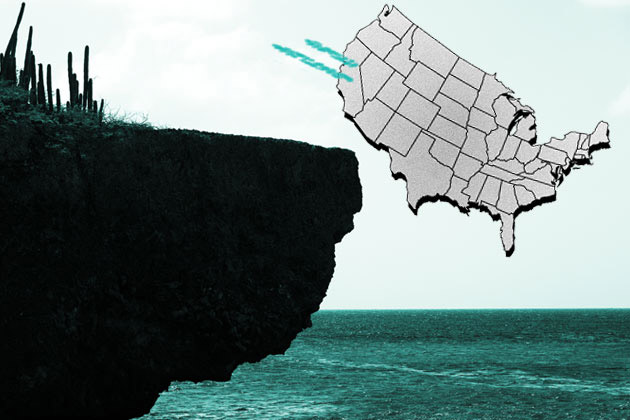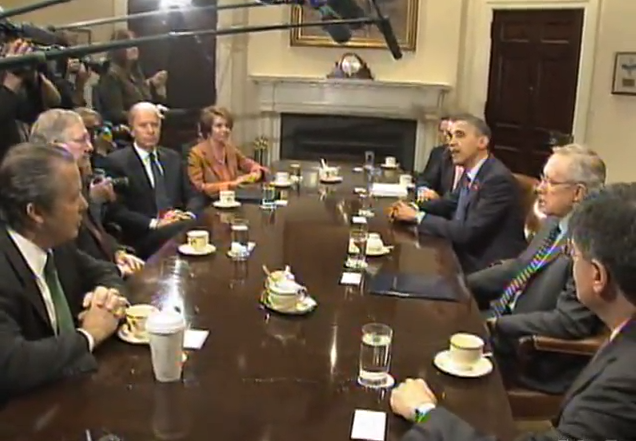The leaders of this nation – a nation very probably until recently the greatest exemplar of what can be accomplished through self governance – are busy in Washington DC trying to solve the enormous quandary of how to avoid the “fiscal cliff”. The quandary has been created by a nation fundamentally addicted to spending on itself, avoiding the bill, and seeking the least painful alternatives to keeping on doing what it is doing to itself. We the People stand by in worried anticipation of what is to come from the least economically perceptive President in history, a Senate that has not met its fundamental constitutional requirement of passing a budget in four years, and a legislative house that can not even get its own members to promote a possible solution. And We the People elected them.
The Fiscal Cliff is an inevitable point of destiny for incoherent and incompetent leadership. Presented as an endgame so terrible that a nation spending on average 1.2 trillion dollars more than it takes in every year, it was assumed the shock of rigid cuts and higher taxes for everyone would prod such leaders into finally facing up to their responsibilities. The cliff automatically would drive tax rates back to their 2001 status and force the gluttonous spending to unfunded levels still twice any deficit spending in the country’s history, but hey, at least in direction of more sane budgeting. In fact the CBO estimated the fiscal cliff would increase the nation’s federal revenues 19 percent while reducing the nation’s spending by 0.25%, resulting in a deficit reduction of 560 billion dollars, with luck under the stratospheric trillion dollar mark it has been functioning at for four years. That doesn’t sound so bad until the estimation as to the effect on the nation’s Gross Domestic Product (GDP) is figured in. The removal of hundreds of billions from the private sector through taxes to reduce but not remove the deficit , while reining in government spending so ludicrously called “stimulus” spending, would reduce the nation’s GDP a whopping 4%. Say hello, recession.
Very likely, the elected leaders in Washington struggle to see the enormity of their profligate spending and cavalier tax policies on the rest of us. It is understandably difficult when your healthcare follows different rules then the rest of us, you are guaranteed a pension unlike the rest of us, and you can position yourself for inflation-protected cost of living increases, at the expense of the rest of us. Jazz Shaw of HotAir.com puts our predicament into easy conceptualization in what he calls U.S Budget for Dummies:
- U.S. Tax Revenue $ 2,170,000,000,000
- Federal Budget $ 3,820,000,000,000
- New Debt $ 1,650,000,000,000
- National Debt $ 14,271,000,000,000
- Recent Budget Cuts $ 38,500,000,000
Lets now remove 8 zeroes and pretend its a household budget:
- Annual Family Income $21, 700
- Annual Money the family spent $38,200
- New debt on the credit card $ 16,500
- Outstanding balance on the credit card $142,710
- Recent household Budget cuts $38.50
As has been identified correctly before, the US government is unlike the family household in a very critical way. It can print money and lend it back to itself to keep on going with the above economics for some time, where as the family household would likely be at a fiscal cliff of some sorts.
And so we approaching what will be the first of many fiscal cliffs. After the President achieves the successful re-framing of the nation’s economic ills as not the challenge of the national household but rather the failure of its most productive members to give sufficiently, taxes will become even more progressive, but not more productive in reducing our debt. The brief holiday for leaders in throwing the rational budget of the United States overboard will soon be overshadowed by the looming generational cliff of unfunded future spending. Somewhere in the first quarter of 2013 the government will come up against the movable line in the sand known as the debt ceiling, having exceeded trillions of dollars of wiggle room in only a year and a half. We the People can obviously absorb bad economic policy, but can a country in which half its participants look to the government for their daily milk, do without milk if the government is forced to shut down? Not likely.
Let’s just hope the nation is girded for what is to come.
In the mean time, pass the milk and cookies.

